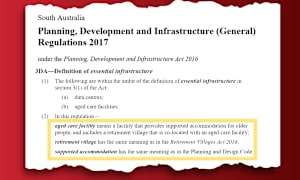The Victorian Government has passed the most significant reform of the Retirement Villages Act 1986 to date, reshaping the economic and operational foundations of retirement villages across the state.
The main details:
1. Standardised contracts and enhanced transparency
- Introduction of standardised contracts.
-
Operators will now be required to provide clear information statements, replacing previous fact sheets and disclosure documents.
-
Operators will also need to provide insurance information to prospective and existing residents.
2. Contractual and financial changes
- Introduction of an exit entitlement scheme requiring exit payments within 12 months of a resident vacating a unit. A definition of ‘vacant possession’ has also been included in amendments to the Bill.
-
Deferred Management Fees (DMFs) to be calculated solely on the resident's ingoing contribution.
-
Residents will not be responsible for costs associated with renovations or upgrades upon departure; they are only liable for reinstatement costs, excluding fair wear and tear.
-
Operating deficits must be funded by the operator and cannot be carried forward or funded through the capital replacement fund, increased maintenance charges, or a special levy.
3. Capital maintenance and replacement
- Full responsibility for capital replacement, maintenance, and refurbishment shifted to operators.
-
Operators are responsible for maintaining and repairing items of capital, funded through maintenance charges and the Capital Maintenance Fund.
-
Capital replacement will be the responsibility of the operator.
4. Mandatory Code of Practice
- A mandatory Retirement Villages Code of Practice to be developed later this year, in consultation with residents and operators, to ensure consistent standards across all villages.
-
The Code of Practice will build on the Retirement Living Code of Conduct, which was developed by the Retirement Living Council and Ageing Australia.
5. Dispute resolution mechanisms
- Establishment of a new alternative dispute resolution service within the Department of Government Services to handle certain disputes.
-
More serious disputes, especially those involving contract terminations or significant financial matters, will still be escalated to the Victorian Civil and Administrative Tribunal (VCAT).
6. Enhanced regulatory oversight
-
Consumer Affairs Victoria will be granted stronger enforcement powers, including the authority to require operators to provide information and comply with regulations.
-
The Commissioner for Residential Tenancies will support research, advocacy, and provide advice to the government on retirement village matters.
7. Resident rights and protections
-
Operators are prohibited from removing residents for health reasons if the resident can be adequately cared for within their home using available care services.
-
Villages are now required to prepare emergency management plans and conduct annual evacuation exercises to ensure resident safety.
Parts of the new legislative will apply prospectively, with others parts retrospectively.
Prospective
- Financial requirements (DMF, exit entitlements, recurrent charges ceasing)
- Capital maintenance and replacement
- Standard contracts
Retrospective
- Breach, termination (unless a notice issued prior to commencement of the Act)
- Contract checks
- Disputes
RLC's reaction
Retirement Living Council Executive Director Daniel Gannon told The Weekly SOURCE the Mandatory Code of Practice was of "particular significance".

"The adoption of our voluntary Code as a basis for government regulation affirms its value in promoting and protecting resident rights, and setting a benchmark for best practice across the industry," he said.
"However, the RLC remains concerned that some provisions in the legislation may potentially erode the relative affordability of units within retirement villages in the future.
"Given Australia’s population continues to age, housing supply is in deficit and the aged care sector is buckling under the weight of increasing demand, we are less supportive of changes that make new supply harder.
"It is important to note that many of these legislative changes will apply prospectively, which is a first in recent reforms around Australia."
New regulations due to start by May 2026
The RLC's immediate focus now turns to the development of the regulations, which must commence no later than 1 May 2026.
"This creates a limited timeframe for government to undertake appropriate consultation and ensure a workable regulatory framework ahead of the new legislative regime coming into force," Daniel said.
"In South Australia, the State Government worked on its regulations concurrent to the passage of its bill, while in Western Australia the Government hit the ground running once its bill passed parliament. We’re yet to see this approach in Victoria, meaning the clock is well and truly ticking."
What do the lawyers say
Lawyers Thomson Geer said further changes have been made to the Amendment Bill which seek to clarify and enhance specific provisions:
- Clarifying key terms: The Amendment Bill introduces a clearer legislative basis for interpreting "vacant possession" and "permanent vacation" in relation to a resident's premises.
- More transparency for residents: Operators must now include additional mandatory insurance information in the publicly available information statement and outline insurance details for the village during contract checks with residents.
- Cooling-off period extended: The mandatory cooling off period will be increased from three to seven business days.
- Resident meetings: Introduction of a sliding scale in relation to quorums at residents meetings (based on the number of residents entitled to vote at a village) with the intention being to strike a balance between supporting residents’ participation and ensuring that quorums for residents meetings are workable.
- No fees after death: Operators will be prohibited from charging maintenance or optional service fees after a resident passes.
- Fairer rules for pets: Village by-laws must not unreasonably prevent residents from keeping a pet in their home.

"These changes are a clear signal that the Victorian State Government is serious about lifting standards and safeguarding residents' rights in the retirement living sector. The amendments position Victoria as a leader in consumer protection in the rapidly expanding and evolving seniors living industry," said Thomson Geer's lawyer Nikolas Miljkovic.
Get the most important industry news straight to your inbox. Subscribe to our free newsletter: https://www.theweeklysource.com.au/newsletter-subscription-form











